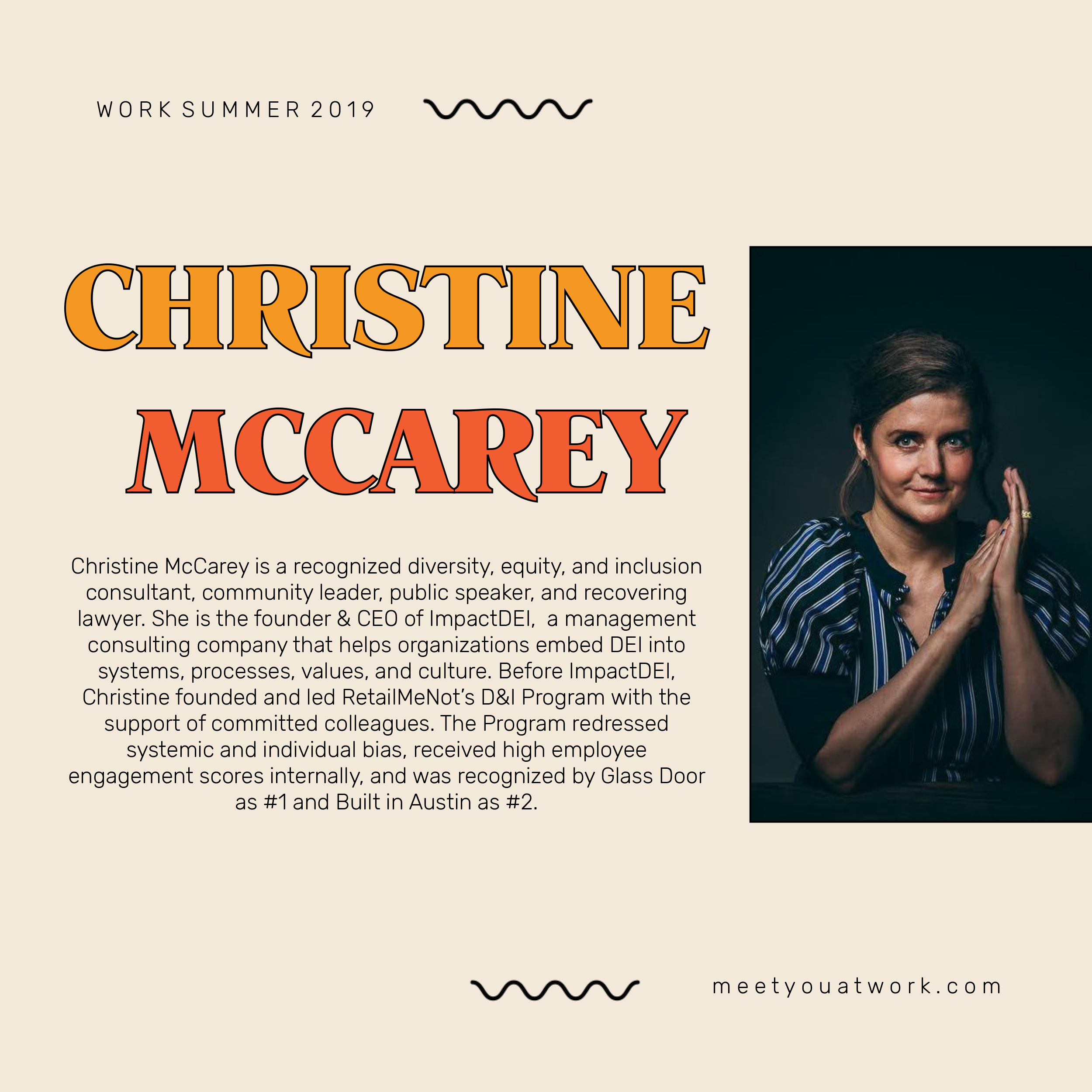On Healthy, Collaborative Work Environments: DEI Expert Christine McCarey
One of this summer’s WORK sessions, Cultivating Collaborative Work Environments, will be led by Christine McCarey, a diversity, equity, and inclusion (DEI) leader, public speaker, and recovering lawyer.
Sydney Greene, the curator behind Christine’s session and a #BBATX committee member, spoke with Christine about what DEI means to her, how to prioritize and manage healthy work environments for employees and how she takes care of herself in her line of work.
who:
Christine McCarey is a recognized diversity, equity, and inclusion consultant, community leader, public speaker, and recovering lawyer. She is the founder & CEO of ImpactDEI, a management consulting company that helps organizations embed DEI into systems, processes, values, and culture. Before ImpactDEI, Christine founded and led RetailMeNot’s D&I Program with the support of committed colleagues. The Program redressed systemic and individual bias, received high employee engagement scores internally, and was recognized by Glass Door as No. 1 and Built in Austin as No. 2.
For those who are unfamiliar with DEI, what is it and how does this approach work to uphold social and economic values in workplaces?
DEI is an acronym for diversity, equity, and inclusion. It is well documented that DEI improves business results and viability given shifting demographics and cultural norms. Too often, though, acronyms and euphemisms dilute the social value of this work. DEI advocates want to upend systemic and individual bias (e.g., racism and sexism) and facilitate meaningful power shifts.
How do you define healthy workplaces and what do they look like? What are some initial steps leaders can take to evaluate if the environment they are managing is healthy for employees?
Inclusion drives diversity, so I am glad you asked this question. Inclusive, healthy workplaces are collaborative and address psychological and physical safety. Team members feel valued, welcomed, respected, and heard.
Listed below are a few of the elements you will find in healthy workplaces. It is well documented that leaders who equally emphasize performance- and health-related efforts gain a competitive advantage.:
The C-suite visibly and consistently supports DEI.
Leaders, particularly people-managers, model inclusive behavior.
DEI is a strategic growth initiative, with articulated goals, metrics, targets and accountability.
Open, transparent communication exists at all levels. Communication channels and styles that encourage introverts to speak are welcomed.
Community engagement is supported, including financially.
Representation data is published internally and periodically updated.
Processes, policies, codes of conduct, and guidelines are clear, equitable and enforced.
Employee sentiment data (e.g., engagement surveys) is shared and actionable.
Micro-aggressions are unusual and promptly redressed. Micro-affirmations (small, inclusive behaviors that encourage and validate folks) are common.
Bro-culture is discouraged.
An initial step leaders can take is to use open forums and anonymous communication tools (e.g., Slido) to actively listen and respond to team member feedback. Underrepresented groups should not be expected to lead DEI efforts, but their input is invaluable. Feedback from engagement surveys, onboarding surveys, and trainings are helpful too.
How can leaders prioritize and manage empathy within their companies/on their teams? What does that look like?
I am a fan of Deloitte’s 6 traits of inclusive leadership. We all know “leaders” who have the title, but not the following. In an organization where titled leaders realize their colleagues lack the necessary leadership traits, it is their responsibility to facilitate ensuring these folks actively listen and educate themselves through training, coaching, or otherwise. Folks who resist constructive input are not serving the organization, its team members, or its customers.
How do you take care of yourself?
Successful DEI practitioners must engage in extreme self-care; otherwise, burnout ensues. I love forest bathing, reading literary fiction, spending time with loved ones (especially my partner and our cats), moviegoing, bubble baths, traveling, and resting. To step up my self-care regimen, I also have started saying no more often and creating healthier boundaries.
What's something you've unlearned lately that you're grateful for?
I have unlearned that anger is bad. Systemic sexism and racism created this construct. Brittney Cooper, Audre Lorde, Rebecca Traister, Mary Beard, Adrienne Rich, bell hooks, and many others have eloquently expressed the transformative power of anger. My mission is to transmute privilege, skills, and anger into positive change for others.
To learn more about Christine McCarey and her work with diversity, equity, and inclusion, visit impactdei.com or follow her work on Twitter at @bluepistrophe.
About WORK: WORK is a biannual pop-up space, designed for sharing new ideas and approaches to creative and entrepreneurial work. The event's panels, workshops and speaker sessions explore personal and professional curiosity, storytelling, diversity and equality, business management and creative entrepreneurship. Our next conference pops up in July 2019 at Rowling Hall in Austin, Texas. ✨Click here for more information.



